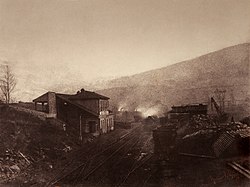Wikipedia:Main Page history/2011 January 25
|
|
|
|
Other areas of Wikipedia
- Help desk – Ask questions about using Wikipedia.
- Reference desk – Serving as virtual librarians, Wikipedia volunteers tackle your questions on a wide range of subjects.
- Village pump – For discussions about Wikipedia itself, including areas for technical issues and policies.
- Community portal – Bulletin board, projects, resources and activities covering a wide range of Wikipedia areas.
- Site news – Announcements, updates, articles and press releases on Wikipedia and the Wikimedia Foundation.
- Local embassy – For Wikipedia-related communication in languages other than English.
Wikipedia's sister projects
Wikipedia is hosted by the Wikimedia Foundation, a non-profit organization that also hosts a range of other projects:
| |
Commons Free media repository |
|
Wikinews Free-content news |
|
Wiktionary Dictionary and thesaurus |
| |
Wikiquote Collection of quotations |
|
Wikibooks Free textbooks and manuals |
|
Wikisource Free-content library |
| |
Wikispecies Directory of species |
|
Wikiversity Free learning materials and activities |
|
Meta-Wiki Wikimedia project coordination |
Wikipedia languages
This Wikipedia is written in English. Started in 2001, it currently contains 3,540,949 articles. Many other Wikipedias are available; some of the largest are listed below.
- More than 500,000 articles: Deutsch · Español · Français · Italiano · Nederlands · 日本語 · Polski · Português · Русский
- More than 150,000 articles: Català · Česky · 한국어 · Magyar · Norsk (bokmål) · Suomi · Română · Svenska · Türkçe · Українська · Tiếng Việt · 中文
- More than 100,000 articles: العربية · Bahasa Indonesia · Български · Dansk · Esperanto · فارسی · עברית · Lietuvių · Slovenčina · Slovenščina · Српски / Srpski
- More than 50,000 articles: Bahasa Melayu · Eesti · Ελληνικά · Simple English · Euskara · Galego · Hrvatski · Norsk (nynorsk) · ไทย





